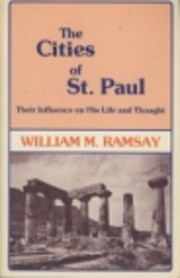

Klik op een omslag om naar Google Boeken te gaan.
|
Bezig met laden... Cities of St. Paul, The: Their Influence on His Life and Thought: The Cities of Eastern Asia Minordoor Sir William Mitchell Ramsay
 Geen Bezig met laden...
Meld je aan bij LibraryThing om erachter te komen of je dit boek goed zult vinden. Op dit moment geen Discussie gesprekken over dit boek. Geen besprekingen geen besprekingen | voeg een bespreking toe
This historic book may have numerous typos and missing text. Purchasers can usually download a free scanned copy of the original book (without typos) from the publisher. Not indexed. Not illustrated. 1908 edition. Excerpt: ... any information about a Jewish element in the city; for, as we have seen, that element was concealed under Greek forms and names, and the Greeks were never ready to acknowledge that Jews had any part in founding a Hellenic city. Only when complaining to some over-lord against their Jewish fellow-citizens as not taking fair part in the life of the city,19 do they seem ever to have admitted that Jews formed an element in a Hellenic city. Strabo's evidence is entirely confirmed by the epitaph found in Rome of an Antiochian who had travelled to the great city of the Empire, and probably settled there: -- A Magnesian of Phrygia (am I); and Appe, devoted as a virgin to the Scythian goddess (Artemis Tauropolos), nursed me in the olive-clad Anthian plain." That "Magnesian of Phrygia" should be a poetic equivalent of "Antiochian" is in exact agreement with Strabo. In both authorities all thought of a native Phrygian or a Jewish element in the population of the city is lost . IV. The Phrygians Of Antioch. That in the Seleucid garrison cities generally there was a native element in the population may be taken as practically certain. A city peopled purely by foreigners might have been efficient as a military stronghold, but could never have been serviceable in the other purpose for which those colonies were intended, viz., in acting as a civilising centre from which the type of manners and education favoured by the Seleucid policy might spread over the surrounding land and people. The native element in the cities acted as an intermediary between the foreign colonists and the surrounding natives; the Phrygian citizens shared in the rights and in the education of the colonists, while blood and feeling and language united them at first with the... Geen bibliotheekbeschrijvingen gevonden. |
Actuele discussiesGeenPopulaire omslagen
 Google Books — Bezig met laden... Google Books — Bezig met laden...GenresDewey Decimale Classificatie (DDC)225.92Religions Bible New Testament Biblical geography and history BiographyLC-classificatieWaarderingGemiddelde: (4) (4)
Ben jij dit?Word een LibraryThing Auteur. |
||||||||||||||||||||||||||||||||||||||||||||||||||||||||||||||||||||||||||||||||||||||||||||||||||||||||||||||||||||||||